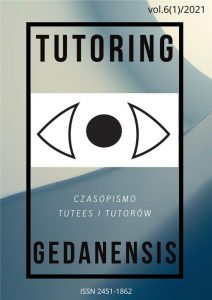Czy peer collaboration może stać się obszarem do swobodnego rozwoju naukowego?
DOI:
https://doi.org/10.26881/tutg.2021.1.07Słowa kluczowe:
peer collaboration, peer tutoring, rozwój naukowyDownloads
Bibliografia
Aronson, E., Stephan, C., Sikes, J., Blaney, N., Snapp, M., 1978. The jigsaw classroom. Sage.
Barnett, R., 1992. Improving Higher Education. Buckingham: Open University.
Damon, W., Phelps, E., 1989. Critical distinctions among three approaches to peer education. International Journal of Educational Research, 13, 9-19.
Ellis, R., 1993. Quality Assurance for University Teaching. Buckingham: Open University Press.
Entwistle, N., 1992. The Impact of Teaching and Learning Outcomes in Higher Education: A Literature Review. Sheffield: Universities and Colleges Staff Development Unit, CVCP.
Laurillard, D., 1993. Rethinking University Teaching. Buckingham: Open University Press.
Merriam, R., Caffarella, R.S., 1991. Learning in Adulthood. San Francisco: Jossey-Bass.
Sharan, S., Sharan, Y., 1976. Small Group Teaching, Englewood Cliffs, N.J.: Edcational Technology Publications.
Slavin, R.E., 1986. Using Student Team Learning. 3rd Edition. Baltimore, MD: Johns Hopkins University. Centre for Research on Elementary and Middle Schools. [Google Scholar].
Sparks, D., 2002. Designing powerful staff development for teachers and principals, Oxford, OH: National Staff Development Council.
Stemberg, R.J., 1985. Beyond I.Q. Cambridge and New York: Cambridge University.
Sullivan, H. S., 1953. The interpersonal theory of psychiatry. New York: Norton.
Rosen, S., Powell, E.R., Schubot, D.B., Rollins, P., 1978. Competence and tutorial role as status variables affecting peer-tutoring outcomes in public school settings. Journal of Educational Psychology, 70(4), 602- 612.

 Uniwersyteckie Czasopisma Naukowe
Uniwersyteckie Czasopisma Naukowe



